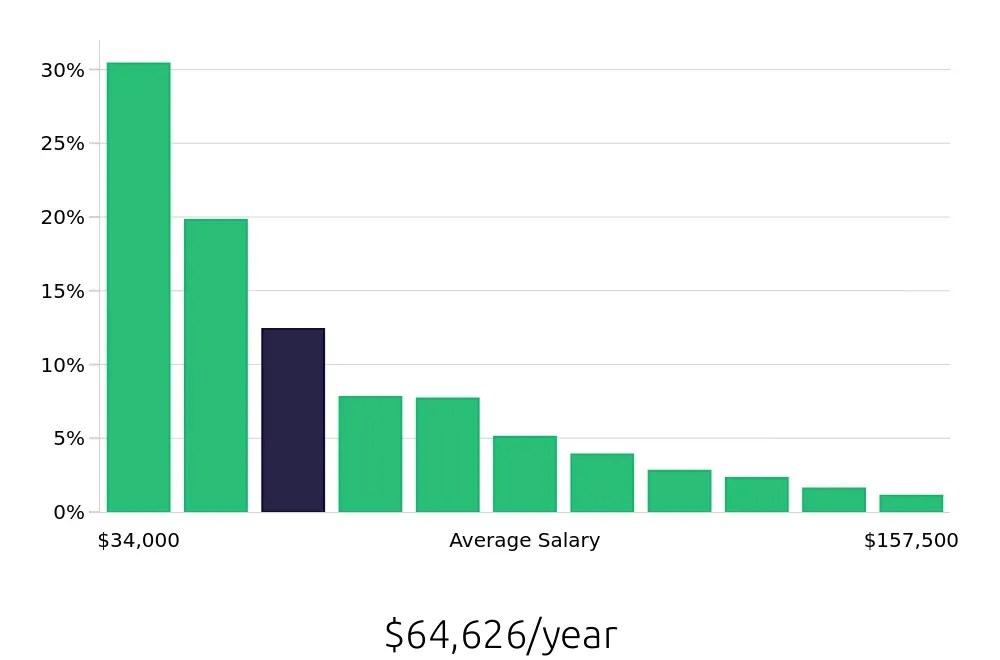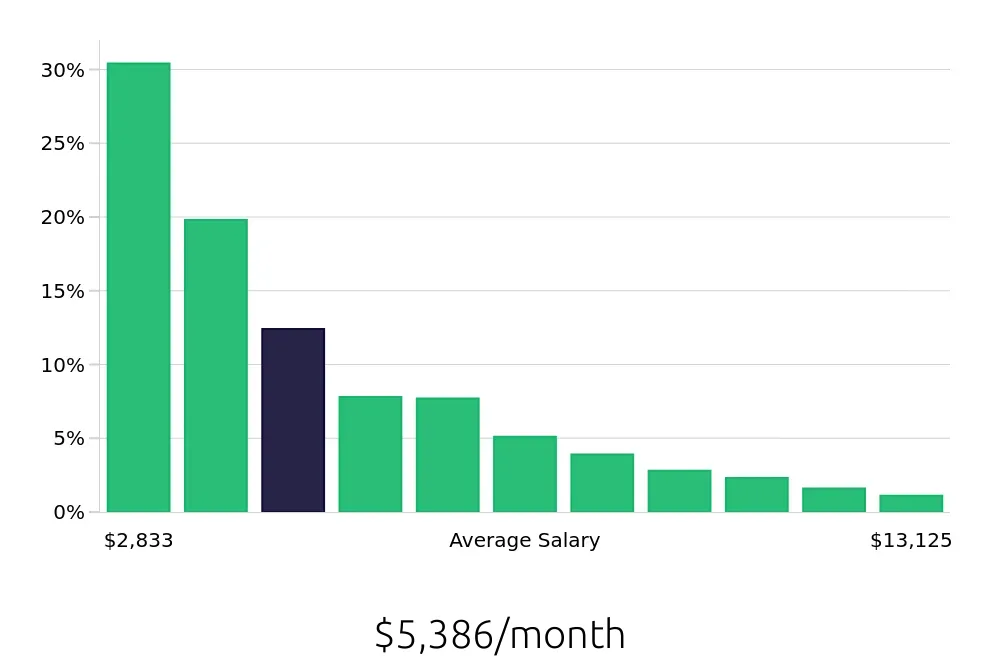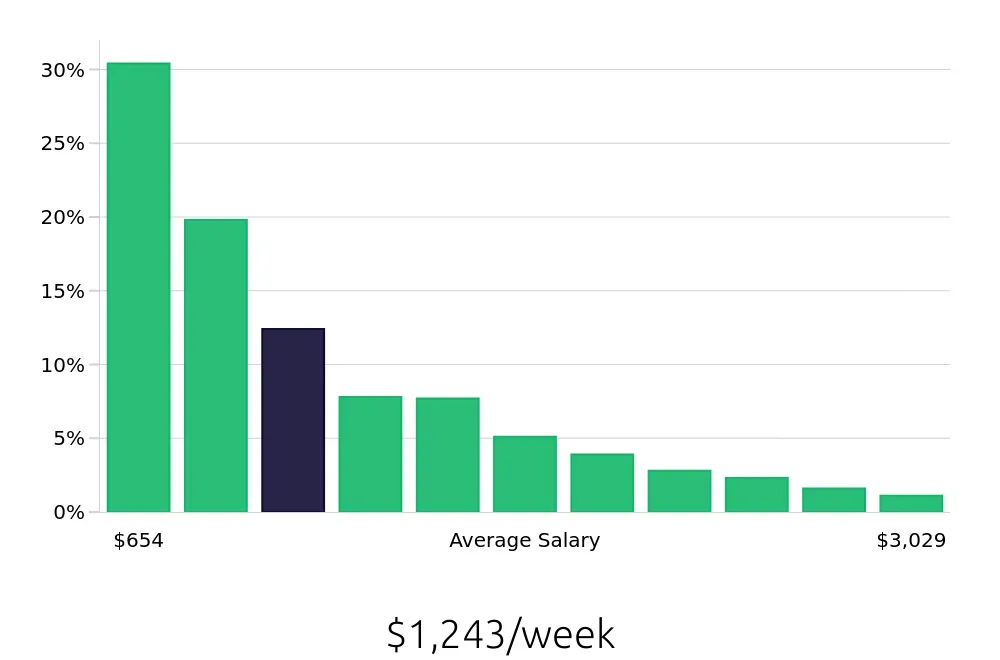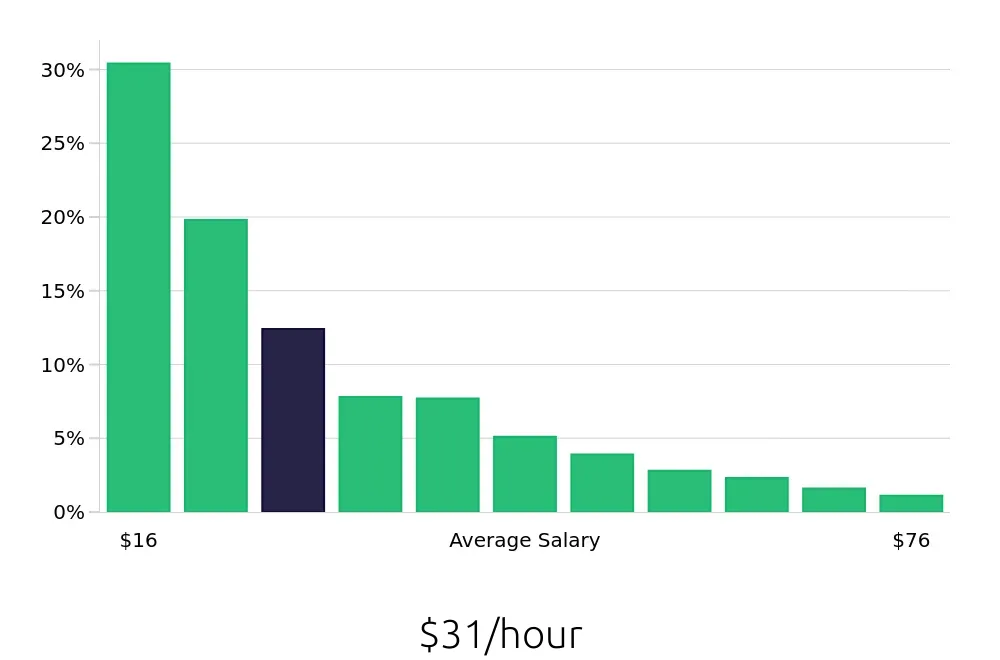What is the average salary in Auburn, WA?
Auburn, WA, offers a range of salary opportunities across different industries. The average yearly salary in Auburn stands at $64,626. This figure reflects the diverse economic landscape, providing job seekers with various earning potentials. Understanding these figures can help in setting realistic expectations and targeting suitable job sectors.
Different sectors in Auburn pay varying salaries. The highest-paying jobs often fall within sectors such as finance and healthcare, while other industries like retail and hospitality offer more modest salaries. Here’s a closer look at the salary distribution:
- Finance and insurance: Up to $157,500
- Healthcare: Up to $146,273
- Retail: $34,000 to $45,227
- Hospitality: $34,000 to $56,455
Job seekers can use these insights to guide their career choices, focusing on sectors that match their skills and aspirations.
What are the best paying jobs in Auburn, WA?
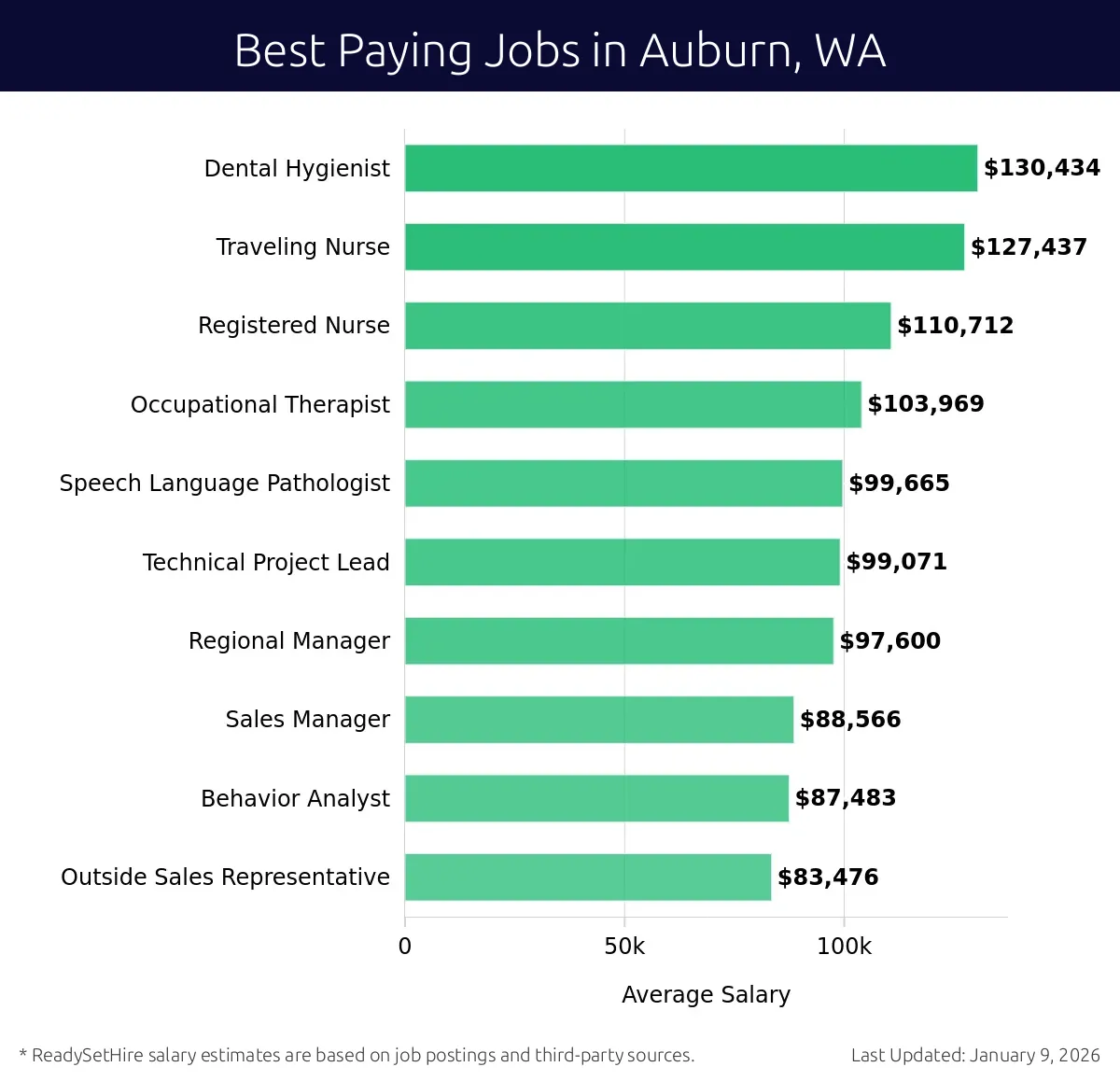
-
Dental Hygienist
Average Salary: $130,434
Support dental health with cleanings and exams. Work in modern clinics and private practices. Perform duties to prevent disease and promote oral health.
Find Dental Hygienist jobs in Auburn, WA
-
Traveling Nurse
Average Salary: $127,437
Provide healthcare in various settings. Travel to different locations as needed. Work with diverse patient populations and medical teams.
Find Traveling Nurse jobs in Auburn, WA
-
Registered Nurse
Average Salary: $110,712
Offer direct patient care. Work in hospitals, clinics, and private practices. Administer treatments and monitor patient progress.
Find Registered Nurse jobs in Auburn, WA
-
Occupational Therapist
Average Salary: $103,969
Help individuals regain skills. Work with patients of all ages. Create personalized therapy plans to improve daily living skills.
Find Occupational Therapist jobs in Auburn, WA
-
Speech Language Pathologist
Average Salary: $99,665
Assist people with communication and swallowing. Work in schools, clinics, and private practices. Provide therapy to improve speech and language abilities.
Find Speech Language Pathologist jobs in Auburn, WA
-
Technical Project Lead
Average Salary: $99,071
Manage tech projects from start to finish. Lead teams to achieve project goals. Work with software and hardware development companies.
Find Technical Project Lead jobs in Auburn, WA
-
Regional Manager
Average Salary: $97,600
Oversee business operations in a region. Coordinate between different departments. Work for large companies to ensure efficient business practices.
Find Regional Manager jobs in Auburn, WA
-
Sales Manager
Average Salary: $88,566
Lead sales teams to meet targets. Develop strategies to boost sales. Work with both retail and corporate clients.
Find Sales Manager jobs in Auburn, WA
-
Behavior Analyst
Average Salary: $87,483
Study and improve behaviors. Work with clients to develop new skills. Provide services in schools, clinics, and private practices.
Find Behavior Analyst jobs in Auburn, WA
-
Outside Sales Representative
Average Salary: $83,476
Sell products to businesses. Travel to meet clients. Build relationships and close deals to meet sales goals.
Find Outside Sales Representative jobs in Auburn, WA
What are the best paying jobs in Auburn, WA without a degree?
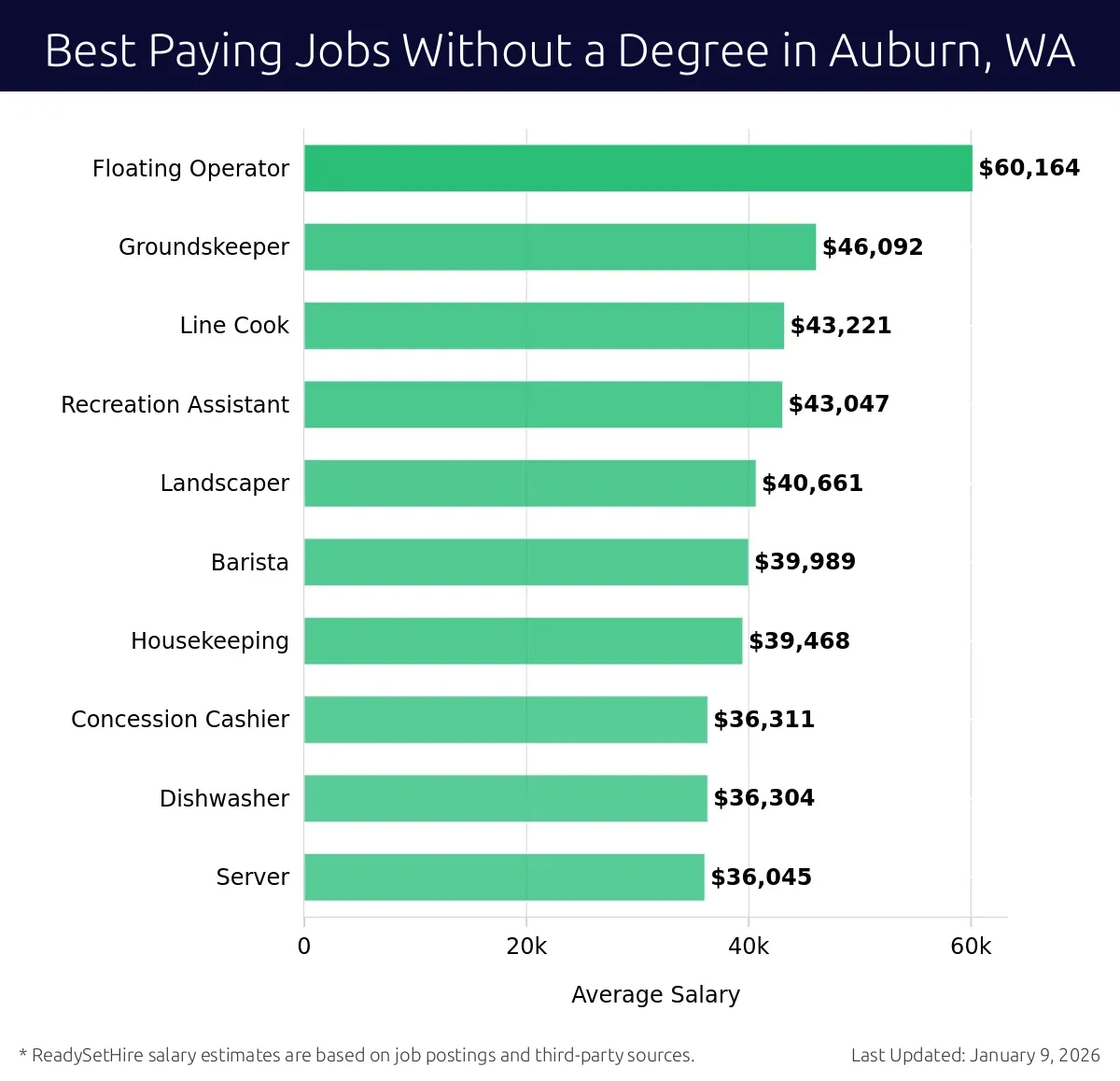
-
Floating Operator
Average Salary: $60,164
This role involves monitoring pools and ensuring safety. The job takes place at local pools, ensuring patrons have a safe environment. Companies in Auburn look for operators with strong attention to detail and swimming skills.
Find Floating Operator jobs in Auburn, WA
-
Groundskeeper
Average Salary: $46,092
Work outdoors maintaining parks and recreational areas. This position requires maintaining the city's green spaces in a pleasant condition. Companies like local parks and golf courses need individuals who are good with hands-on work.
Find Groundskeeper jobs in Auburn, WA
-
Line Cook
Average Salary: $43,221
Prepare meals in a fast-paced kitchen setting. Work in local restaurants, focusing on creating delicious dishes quickly and efficiently. The job demands strong teamwork and cooking skills.
Find Line Cook jobs in Auburn, WA
-
Recreation Assistant
Average Salary: $43,047
Help organize and run community programs and activities. This position involves working in community centers and parks. Companies seek assistants who enjoy engaging with people of all ages.
Find Recreation Assistant jobs in Auburn, WA
-
Landscaper
Average Salary: $40,661
Work outdoors, planting, trimming, and maintaining gardens and lawns. This role is ideal for those who enjoy working with plants and improving outdoor spaces. Companies look for landscapers with good physical stamina.
Find Landscaper jobs in Auburn, WA
-
Barista
Average Salary: $39,989
Serve coffee and other beverages in cafes. The job involves preparing drinks and maintaining a welcoming atmosphere. Local cafes seek baristas with a passion for coffee and good customer service skills.
Find Barista jobs in Auburn, WA
-
Housekeeping
Average Salary: $39,468
Clean and maintain rooms in hotels or motels. This role involves ensuring guest rooms are tidy and comfortable. Companies look for housekeepers who are detail-oriented and hardworking.
Find Housekeeping jobs in Auburn, WA
-
Concession Cashier
Average Salary: $36,311
Handle transactions and manage cash in event venues. The job takes place at venues like theaters and stadiums. Companies need cashiers who are quick and accurate with numbers.
Find Concession Cashier jobs in Auburn, WA
-
Dishwasher
Average Salary: $36,304
Clean dishes and kitchen equipment in restaurants. This role demands attention to detail and a strong work ethic. Local restaurants look for dishwashers who can handle a busy kitchen environment.
Find Dishwasher jobs in Auburn, WA
-
Server
Average Salary: $36,045
Serve food and drinks to customers in a restaurant setting. The job involves taking orders and ensuring customers have a pleasant dining experience. Companies seek servers with good communication and customer service skills.
Find Server jobs in Auburn, WA
Which companies offer the top salaries in Auburn, WA?
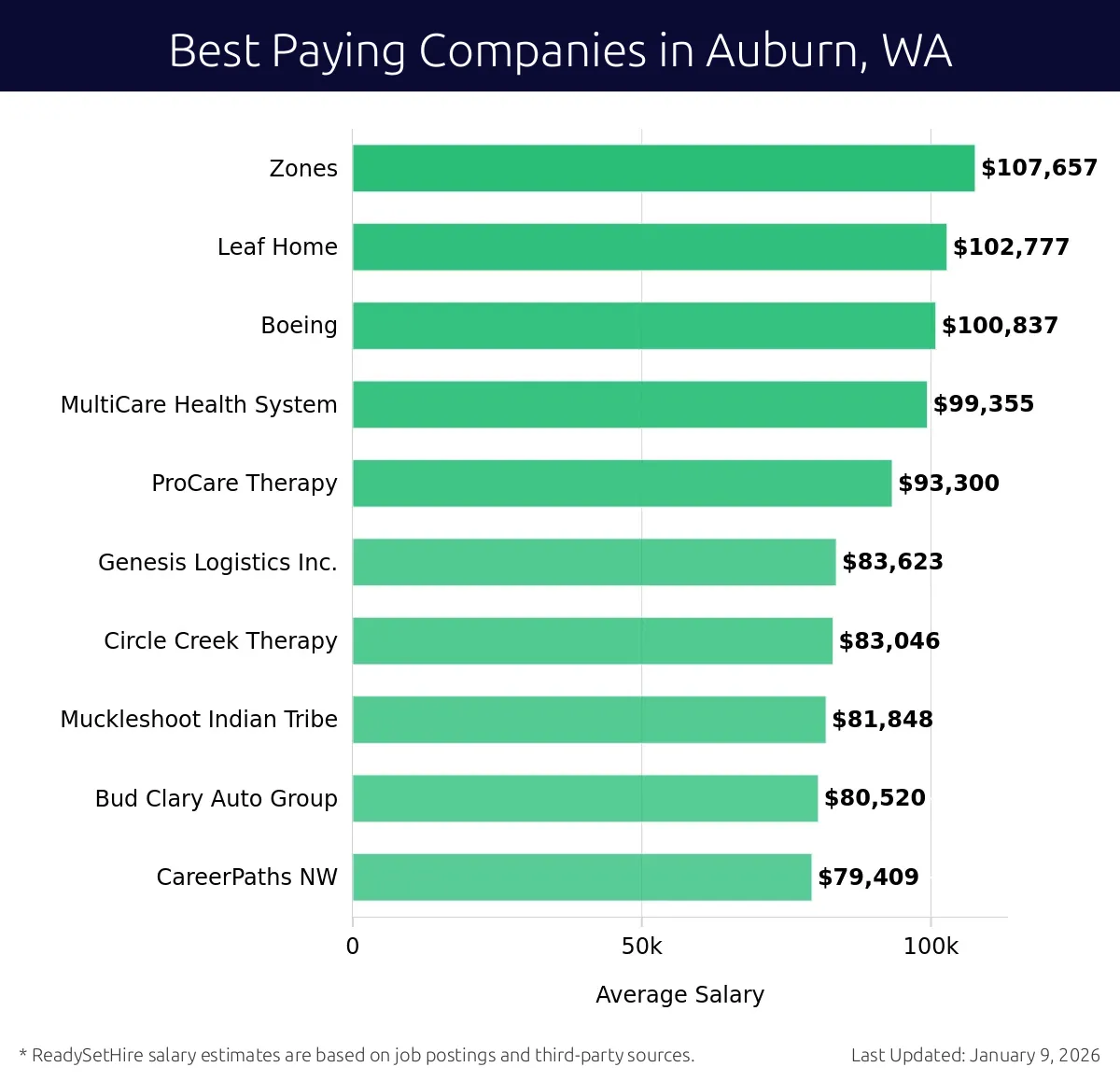
-
Zones
Average Salary: $107,657
Zones provides services in the renewable energy sector. They are dedicated to sustainability and innovation.
-
Leaf Home
Average Salary: $102,777
Leaf Home offers residential remodeling services. They focus on quality and customer satisfaction.
-
Boeing
Average Salary: $100,837
Boeing is a global aerospace leader. They design, manufacture, and sell airplanes, rockets, and satellites.
-
MultiCare Health System
Average Salary: $99,355
MultiCare Health System provides healthcare services. They aim to improve the well-being of their patients.
-
ProCare Therapy
Average Salary: $93,300
ProCare Therapy specializes in rehabilitation services. They focus on helping patients recover and improve their quality of life.
-
Genesis Logistics Inc.
Average Salary: $83,623
Genesis Logistics Inc. offers freight transportation and logistics services. They are committed to efficiency and reliability.
-
Circle Creek Therapy
Average Salary: $83,046
Circle Creek Therapy provides physical and occupational therapy. They aim to support patients' recovery and wellness.
-
Muckleshoot Indian Tribe
Average Salary: $81,848
The Muckleshoot Indian Tribe operates in tribal governance and community services. They focus on preserving their culture and improving community well-being.
-
Bud Clary Auto Group
Average Salary: $80,520
Bud Clary Auto Group is a leading dealership group. They offer a wide range of vehicle brands and services.
-
CareerPaths NW
Average Salary: $79,409
CareerPaths NW provides career coaching and job placement services. They help individuals achieve their career goals.
How does the cost of living in Auburn, WA compare to the national average?
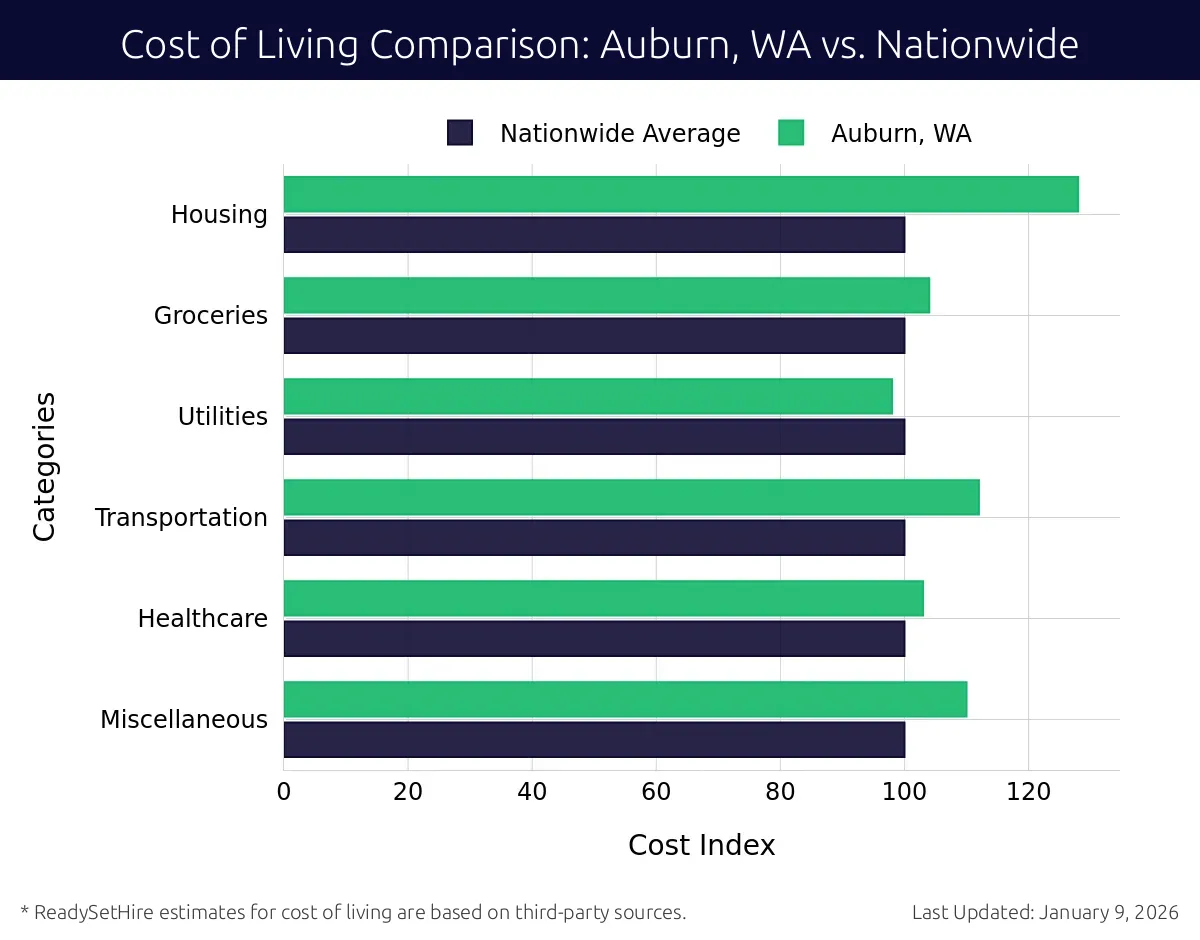
Auburn, Washington has a cost of living index that varies across different categories compared to the nationwide average. Housing costs in Auburn are 28% higher, with an index of 128. This means that housing expenses here are nearly 30% more than the national average. Similarly, transportation costs are also above average, standing at 12% higher with an index of 112. Despite these increases, the costs for groceries and healthcare remain relatively close to the national average. Groceries have an index of 104, which is 4% higher, while healthcare has an index of 103, which is nearly at par with the national average.
Utilities in Auburn are slightly lower than the nationwide average, with an index of 98, indicating a 2% decrease. Miscellaneous expenses also show a moderate rise, with an index of 110, meaning costs are 10% higher than the national average. This data shows that while some aspects of living in Auburn are more expensive, others are comparable or even cheaper than the national average. Job seekers should consider these variations when planning their budgets.

